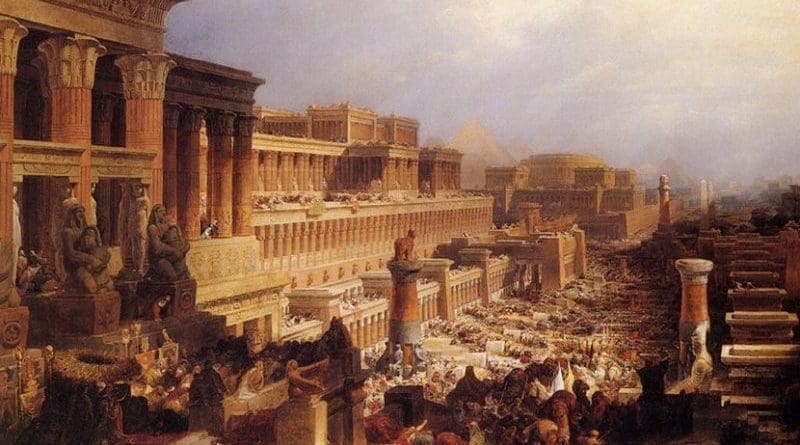Pharaoh’s Anti-Israelite Policy Explained – OpEd
Why were the Jews enslaved in Egypt? A French Egyptologist, Alain Zivie, points to a new suspect: Pharaoh’s vizier ‘Abdiel, whose Semitic name means ‘a servant of [the god] El’.
“Abdiel’s name is very unusual. In Egyptian, it is ‘Aper-El. ‘Aper is the Egyptian way to render the Semitic word ‘abed, which means “servant.”’ So, Alain Zivie believes that the vizier’s name actually would have been pronounced “‘Abdiel.” The second part of his name consists of the name of the god El, the head of the Syro-Canaanite pantheon.
Thus, ‘Abdiel’ means ‘servant of [the god] El’. El is the generic west Semitic linguistic term for ‘god’ and one of the names of the Israelites’ deity in the Hebrew Bible. The names or appellations; El, Elah, Elohei and Elohim are all pre Mosaic west Semitic generic terms for a God; or for many Gods. In these various forms they appear almost 3,000 times in the Hebrew Bible.
The vizier ‘Abdiel had many titles, including “chief of the town”, “general of the horses,” “chief in the entire land,” “messenger of the king” (ambassador), and “father of the god” (a senior advisor who knew the Pharaoh as a child).
‘Abdiel is the only vizier in the entire history of ancient Egypt to be called “child of the kap” (someone raised or educated in the palace). He also bears the title “first servant of Aten in …” Although this title’s ending is not readable, the surviving part shows that ‘Abdiel was connected to the Egyptian Solar disc god Aten, whose worship rose to prominence during Akhenaten’s reign.
In a ten page article “Pharaoh’s Man, ‘Abdiel: The Vizier with a Semitic Name” published in the July/August 2018 issue of Biblical Archaeology Review, Alain Zivie explores this intriguing Egyptian vizier ‘Abdiel, who lived in the 14th century B.C.E. and who likely served two 18th dynasty pharaohs, Amenhotep III and Amenhotep IV (better known by his later self-chosen name Akhenaten).
Akhenaten is famous for his attempt to push the Egyptian court and nobility into worshipping the Solar disc Aten, instead of all the traditional Gods that Egyptians had worshipped for over 2,000 years.
This was the most revolutionary event in Egypt’s religious history, and it failed because Akhenaten died as a young man, and his young son also died a few years later. The general who was acting regent then took over and at his death the next general started the 19th dynasty and ruled in his own name; Rameses.
The Torah states, “When a new king (dynasty), to whom Joseph meant nothing, came to power in Egypt” Pharaoh said to his court nobles, “Look, the Israelites have become far too numerous for us. Come, we must deal shrewdly with them or they will become even more numerous and, if a war breaks out, they will join our enemies, fight against us and leave the country.” (Exodus 1:8-10)
That is what Pharaoh (Ramses I) said, but what he really meant was: although we nobles greatly outnumber the Israelites, their belief in only one God has already influenced two previous Pharaohs (Amenhotep III and especially Amenhotep IV (better known as Akhenaten).
If the Israelite belief in only one God spreads from some of the nobility into the general population, many people might stop believing that Pharaoh himself is the son of God, and that would be very dangerous for the traditional authority of our religious and political establishment, so we should oppress them.
Thus, the attempt of the Egyptian vizier ‘Abdiel, ‘the servant (prophet) of El” to influence Pharaoh Akhenaten and the royal court to forcefully spread monotheism among Egypt’s nobility failed.
Pharaoh’s Ramses oppression policy started a decade or two after the death of the Egyptian vizier ‘Abdiel, ‘the servant (prophet) of El” as is shown by his high status Saqqara tomb which in 1980, Egyptologist Alain Zivie began excavating.
In 1987, the tomb’s burial chamber with the remains of the Egyptian vizier ‘Abdiel, his wife Tauret, and his son Huy was discovered. Each had been buried in three coffins and the grave goods that filled the room included a wood cubit listing some of ‘Abdiel’s prestigious titles.
This is what enabled the biography of the Egyptian vizier ‘Abdiel, ‘the servant (prophet) of El” to be written. The Torah is silent about this episode because ‘Abdiel, ‘the servant (prophet) of El” should not have encouraged Pharaoh Akhenaten to pressure people to become monotheists.
For more information about differing Jewish views of conversion see pages 262-4 in my new book “Which Religion Is Right For You? A Kuzari for the 21st century.” Hadassa Word Press ISBN (978-620-2-45517-6)

